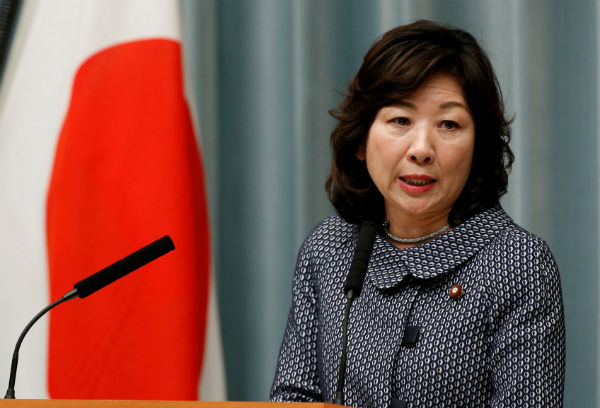Top finance bureaucrat docked pay for harassing reporter

TOKYO (Reuters) -- A Japanese cabinet minister called on Friday for a law to strengthen relief and protection for victims of sexual harassment, but stopped short of urging legal changes to make such acts a crime.
Victims of sexual harassment in Japan have traditionally been reluctant to speak out for fear of being blamed, but heated debate and protests have followed the resignation last month of a top finance bureaucrat over accusations in a weekly magazine. The official, Junichi Fukuda, denied that he had sexually harassed several female reporters, but the ministry later acknowledged he had sexually harassed a reporter and docked his pay by 20 percent for six months.
"What is needed legally is protection and relief for victims," said Internal Affairs Minister Seiko Noda, who is one of only two women in Prime Minister Shinzo Abe's cabinet and often seen as a longshot contender to succeed him.
"Because they are not protected, women are afraid to speak out," Noda, who holds the portfolio for women's empowerment, told Reuters in an interview.
A legal revision in 1997 required Japanese employers to prevent sexual harassment in the workplace but it does not prescribe penalties, and similar rules apply to civil servants.
Noda stopped short of calling for sexual harassment to be made a crime, citing possible negative effects such as causing men to decline to talk to female reporters one-on-one.
"I don't agree that we should start the debate assuming legal penalties (are needed)," said Noda, adding that men in Japan had treated a serious problem lightly.
Finance Minister Taro Aso, 77, has drawn fire for his response to the Fukuda case, saying, for example, that the possibility Fukuda was entrapped could not be ruled out.
"Minister Aso is not a bad person, but he is from a generation that was not educated about sexual harassment and unlike our generation, he didn't need to be very aware of sexual harassment," said Noda, 57.
Aso repeated his comment on Friday in parliament but later withdrew it, Japanese media said. Aso was not available for further comment outside business hours, a finance ministry spokesman told Reuters.
Japan ranked 114 among the 144 nations rated by the 2017 Global Gender Gap report of the World Economic Forum, flanked by Guinea and Ethiopia, and down 13 places since Abe took power.
Noda, who recalled being sexually harassed herself when a young politician, said she wanted to announce steps to fill gaps in how Japan tackles the issue before parliament's session ends in June.
"Comments like, 'If you want a vote, let me touch your breasts,' were a daily occurrence at that time," she said.
"I think this is a problem that I must solve. It's not something that those who were not victims can clear up."
Abe's "Womenomics" policy to improve women's status had borne some fruit but more was needed, Noda said.
"Without fundamental changes in workstyles, the women who can lay the golden egg will not come."




